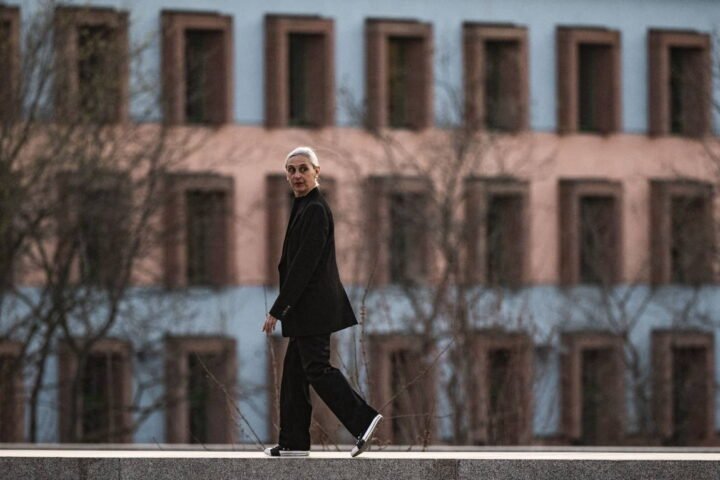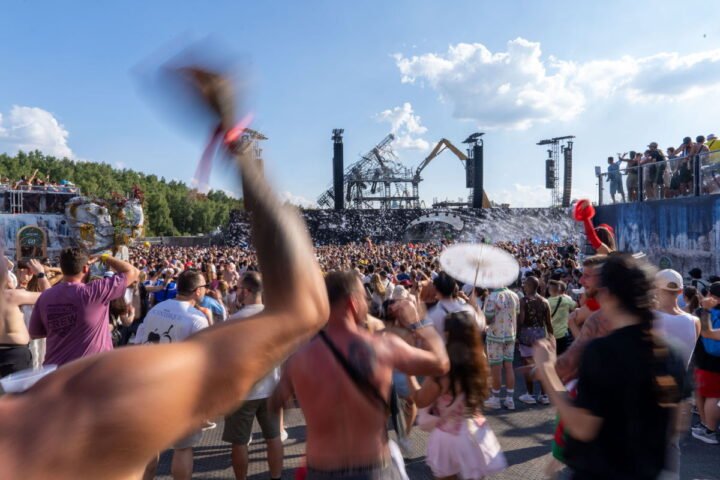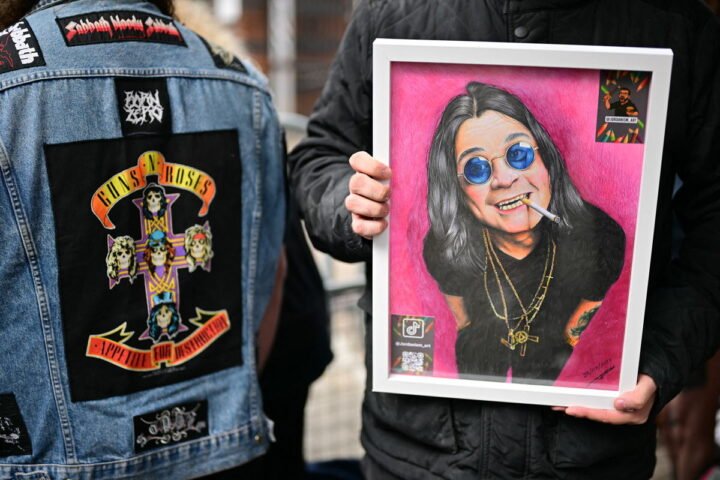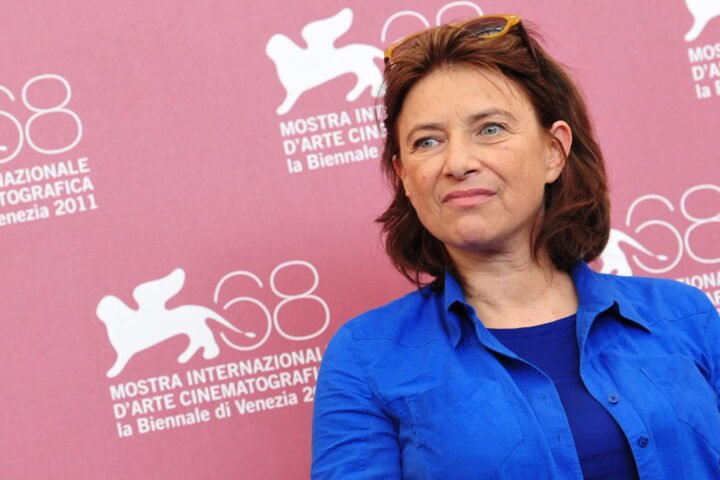For UNESCO World Book Day, the Euronews Culture team shares the books that made them – as well as their reading recommendations.
Today is UNESCO World Book Day, a celebration to promote the enjoyment of books and reading. Each year, events take place all over the world to recognize the scope of books – a link between the past and the future, a bridge between generations and across cultures.
In order to celebrate, the Euronews Culture team has answered a series of six questions each regarding their reading history – a sort of “Books Of Our Lives”.
Here’s what we came up with.
Anca Ulea’s picks
Anca is a reporter and producer with Euronews Culture, who lives in a village in the south of France. Romanian by birth, American by upbringing and French (sort of) by adoption, she recently discovered you can buy used books on Vinted and there’s no looking back. Her stacks of books – both read and unread – are taking up an increasing amount of real estate in her home.

The first book you remember reading: “The Chronicles of Narnia” by C.S. Lewis
My Romanian parents bought me C.S. Lewis’ The Chronicles of Narnia collection when I was 6, because they were a bit lost about what was an appropriate reading level for an American kid my age. I remember struggling through “The Lion, The Witch and the Wardrobe” alone in my room with a dictionary open and feeling immensely proud when I got to the end.
The book you’ve reread the most: “Pride and Prejudice” by Jane Austen
My comfort book is “Pride and Prejudice” by Jane Austen and I’m not ashamed to admit it. It’s a truth universally acknowledged that Austen got me through some angsty teenage years and I come back to the Bennett girls often when I want to feel cozy and warm. The scenes in the English countryside are a salve for existential turmoil: “What are men to rocks and mountains?”
The book that changed you: “On Writing” by Stephen King
Stephen King’s “On Writing” had a major impact on me when I read it in my early 20s. It’s part memoir, part master class from one of the modern masters of fiction. I often think about how King says he keeps his writing desk in the corner of the room as a reminder that his craft should not be the centre of his life. Your life is the centre of your life – writing is what happens around it.
The book you hate that everyone loves: “Such a Fun Age” by Kylie Reid
I really couldn’t get into “Such a Fun Age” by Kylie Reid, even though everyone seemed to love it. Despite its powerful opening scene, there was something so irritating and superficial about all of the characters that I couldn’t get past. Which, I’ll admit, was maybe the point. I think Reid is a talented writer and would read her in the future, but this book just didn’t do it for me.
Guilty admission: The book you’ve never read: “The Lord of the Rings” by J.R.R. Tolkien
I’m disappointed to announce I’ve never read a single Lord of the Rings book, despite having owned the trilogy for over a decade. Your girl is a fan of the films, but has never made the effort to explore Middle-Earth on the written page. Maybe one of these days I will rectify this error. In the meantime, thank you for your understanding.
Your book recommendation: “Slug: And Other Things I’ve Been Told To Hate” by Hollie McNish
Here’s something a little different for you – Hollie McNish’s 2021 book “Slug: And Other Things I’ve Been Told To Hate” was a delight. I came across it by accident while house-sitting a few years back and fell in love with McNish’s blend of poetry, personal essay and short story. Hollie’s writing is raucous and relatable – from grief, to periods, to masturbation, it’s nice to know you’re not alone. Her latest book “Lobster” came out last month, and I can’t wait to read it.
David Mouriquand’s picks
David is Euronews Culture’s deputy editor and chief pencil sharpener. No one tell him that not a soul in the office is using pencils. Half-French, half-British, he doesn’t know what to do when he sees queue: join it, or read Baudelaire to it. He spends most of his time in cinemas, and when he’s not watching films, adds books to what he’s dubbed his ever-growing “pile of shame” – which he is slowly getting through.

The first book you remember reading: “Where The Wild Things Are” by Maurice Sendak
Looking back, I love how Sendak’s 1963 picture book focused on the tumult of childhood, and how the author trusted the validity of children’s emotions. There’s no pandering – just embracing the spirit and logic of childhood, as well as the exuberance of fear and love. “Oh please don’t go – we’ll eat you up – we love you so!” cry out the Wild Things when Max is going home. Even as a child, I loved this very ominous declaration of love. What’s more romantic than wanting to become part of someone else? Cannibalism aside, naturally.
The book you’ve reread the most: “Art” by Yasmina Reza
My pick was going to be Donna Tartt’s “The Secret History”, until I realised that it had to be Yasmina Reza’s “Art”. I was lucky enough to be cast in the play at the end of university. It was already one of my favourites, so I fought hard to get that role. We ended up taking it to the Fringe festival in Edinburgh, so I know the play inside out to this day. I played the character of Marc in this three-person play about how a white monochrome painting tears up a friendship. I love the humour, the way Reza explores the fragile bonds of friendship, and, at the end of the day, how we’re all moving across a blank space before we disappear.
The book that changed you: “Perfume: The Story of a Murderer” by Patrick Süskind
Few books have enveloped me in a mood quite like this one, and it changed me in the way that it completely awakened every one of my senses – specifically olfactory. I didn’t push me to murder, I assure you, but every vivid sensory description in the story of Jean-Bapiste Grenouille leapt out of the page and transported me to a time and place, engulfing me in a tactile overload.
The book you hate that everyone loves: “The Goldfinch” by Donna Tartt
Considering how much I love Donna Tartt – specifically “The Secret History” – this one took me by surprise. I’ve read “The Goldfinch” twice now, and can’t quite understand why this was the one that got the Pulitzer Prize for Fiction. I love the premise and the striking bombing scene in the museum, but it devolves into a sprawling Dickensian mess that indulges in every cliché. Despite the suspense, I couldn’t get with all the narrative detours, and I don’t feel the desire to revisit it a third time.
Guilty admission: The book you’ve never read: “Ulysses” by James Joyce
I’ve put myself through the first four books of Proust’s “In Search of Lost Time” (I’ll get to the last three in the fulness of time); I’ve read most of Dickens; I’ve even struggled through Derrida. However, the one that I’ve never managed to finish is James Joyce’s “Ulysses”. I found it too dense, too obtuse, too overwhelming. I don’t think I possess the instinct that tells me: “Go’wan, give it another go.”
Your book recommendation: “A History of Women in 101 Objects” by Annabelle Hirsch
Published last year, it’s one I dip in and out of, as the short but rich segments that chronicle the hidden history of women through everyday objects is fascinating. It’s a wittily curated compendium that explores, from prehistory to the present day, and with wonderful imaginative leaps, the overlooked histories of women and their fight for freedom. It tells you how mobile phones are related to feminicide; how the 1950s Miele vacuum cleaner is about female creativity; and everything you need to know about glass dildos. Any book that has been described by Gillian Anderson as “a reminder that women are and have always been, whether quietly or vociferously, on the periphery or centre stage, the engine, the glue, the inspiration” demands your attention.
Amber Bryce’s picks
Amber Bryce is a social media journalist for Euronews Culture, and was once described as a “rainbow lady” by a sweet old lady at an antique fair. (Note from her colleagues: “A wonderfully accurate description.”)

The first book you remember reading: “A Scary Story Night” by Rob Lewis
About a rat that conjures sinister imaginings from stormy sounds, my dad used to read it to me before bed, tapping and scraping the walls to mimic the twigs blowing against a window pane. As a very anxious child (that later lost many nights to thinking my mum’s black coat hanging on the bannister was Ghostface from Scream) the rat was very relatable, and Lewis’s softly sketched spooky illustrations of great comfort.
The book you’ve reread the most: “Ghost World” by Daniel Clowes
A graphic novel about two best friends trying to figure life out post graduation, I first discovered it after watching Terry Zwigoff’s movie adaptation in the early aughts. I’ve always loved stories about outsiders; lonely and lost people looking for connection in a society that shuns strangeness. The main character of Enid, sardonic and messy and cool and mean, is one I revisit often. She articulates so well a muddled feeling of drifting from a version of yourself you once knew.
The book that changed you: “Franny and Zooey” by J.D. Salinger
Two novellas published in 1961, “Franny”, which tells the story of a young woman going through a spiritual crisis, pulled me apart and put me back together in a very fundamental way. The evocative, lyrical flow of Salinger’s prose melts inside my brain like a mouthful of warm, sticky caramel that I keep trying to suck from my teeth: “I’m sick of not having the courage to be an absolute nobody.”
The book you hate that everyone loves: “Twilight” by Stephenie Meyer
Perhaps not such a controversial choice, given that making fun of Meyer’s sparkly vampire franchise has become part of its appeal. At the time of its release, a boy I knew told me I’d love it, and so I really, really wanted to. But it was just… silly? I couldn’t connect with the supernatural world. Maybe vampires and werewolves aren’t my “thing”. Maybe I was just too in love with Harry Potter still.
Guilty admission: The book you’ve never read: “Infinite Jest” by David Foster Wallace
At one time, it felt to me that reading this book took you to another dimension of intellect. It is 1,079 pages of dense, fractally structured metamodernism. For the last decade, it has sat on various bookshelves, taunting me. And still, despite having only ever read the first few pages, I sometimes nod along when people mention it as if I, too, have achieved such a reading feat. Maybe everyone else is just doing the same.
Your book recommendation: “How Coppola Became Cage” by Zach Schonfeld
This one goes out to all the Nicolas Cage fans, a detailed documentation of the wonderfully weird and heavily memeified actor’s career up until the mid-90s. Full of fascinating behind the scenes anecdotes, it’s a great insight into one of Hollywood’s most eccentric and beloved stars. Be warned: Your movie watchlist is about to grow extremely long.
Jonny Walfisz’s picks
Jonny is a journalist with Euronews Culture, and the rest is none of your business. DM him for more – if you dare.

The first book you remember reading: “The Jolly Postman or Other People’s Letters” by Janet and Allan Ahlberg
This was one of the first books I remember being able to read on my own. Being able to look inside the post of the book’s wild and varied characters was such a joy and an early chance for me to indulge in my natural nosiness. The witch who’d been delivered a catalogue from Hobgoblin Supplies LTD was a particular highlight.
The book you’ve reread the most: “Molloy” by Samuel Beckett
I don’t generally reread books, but I’ve often found myself returning to sections of “Molloy”. The most powerful thing about art is its ability to provide connections between individuals centuries apart. The humour-tinged melancholy in all of Beckett’s work can light up any lonely moment but nothing in his prose is as rich as this bleak novel.
The book that changed you: “Catch-22” by Joseph Heller
Reading this as a teen felt like a revelation. Just as with all religious experiences, it made no sense to me at first due to the nonlinear storytelling but the humour kept me reading. By the end, the absurdist comedy had paved the way for something sublime. Heller’s unconventional style brought me closer to the heights of what literature could achieve.
The book you hate that everyone loves: “On the Road” by Jack Kerouac
While some will defend it as a self-conscious analysis of youthful malaise, when I read this it reeked of naval gazing. I can appreciate its landmark status in beat poetry but this story of freedom tastes more of selfishness and a distaste for caring. Anyone who claims they love it makes my skin crawl.
Guilty admission: The book you’ve never read: “Ulysses” by James Joyce
Like my colleague, it’s not that I’ve never read it at all – I’ve given up on reading it twice while halfway through. I find Joyce’s preoccupation with his own intelligence insufferable to the point that it always obscures anything of substance in the actual book. Still, I’d like to have read it in full at least once to fully justify my long drunken rants against it.
Your book recommendation: “Do Not Say We Have Nothing” by Madeleine Thien
Epic in all the right ways, this captures the upheaval of the Cultural Revolution in China from the beginning of Mao Zedong’s rule through to the Tiananmen Square Protests in 1989. It’s the way that Thien weaves a narrative through decades of political turmoil via a family of musicians and their love of Soviet composer Dmitri Shostakovich that makes her book the perfect synergy of history and emotion.
Theo Farrant’s picks
Theo Farrant is Euronews Culture’s Video Editor. 23 years old. Hopelessly optimistic Norwich City FC fan. Frequently humiliated by his barber. Cider connoisseur. Part-time DJ in his own bedroom. Can be easily bribed with Skittles. Pixar enthusiast. Backgammon extraordinaire.

The first book you remember reading: “The Tiger Who Came To Tea” by Judith Kerr
This was one of the first books I recall being read to me as a child, and eventually, I picked it up myself. It’s incredibly playful and heartwarming, and I particularly adore Judith Kerr’s illustrations. A lifelong favourite.
The book you’ve reread the most: “Charlie and the Chocolate Factory” by Roald Dahl
Charlie and the Chocolate Factory probably holds the title of my most revisited book, and for good reason. Roald Dahl’s ingenious storytelling and quirky characters never fail to draw me into the chocolate-coated world. It’s a timeless tale that I find myself regularly returning to whenever I need a dose of childhood magic.
The book that changed you: The Harry Potter series
The Harry Potter series holds a very special place in my heart, having profoundly impacted my formative years. The wizarding world taught me about the power of friendship, the importance of standing up for what’s right, and the enduring strength of love and acceptance – quite ironic now considering the hateful actions of a certain She Who Must Not Be Named…
The book you hate that everyone loves: “The Creative Act: A Way of Being” by Rick Rubin
As much as I admire Rick Rubin, I must admit that his highly-praised “The Creative Act: A Way of Being” left me feeling extremely disappointed. While I appreciate its attempt to inspire creativity, the book comes across as somewhat contrived, relying too heavily on clichés and shallow profundities. Essentially, it’s a drawn out collection of Instagram quotes. Pass.
Your book recommendation: “A Waiter in Paris” by Edward Chisholm
For those seeking an enthralling journey into the bustling world of Parisian dining, I wholeheartedly recommend Edward Chisholm’s “A Waiter in Paris”. The British author’s debut memoir offers a glimpse into the highs and lows of life as a waiter in the French capital, complete with a cast of eccentric characters and humorous anecdotes. Eye-opening, entertaining and heartfelt.
Source: Dw








